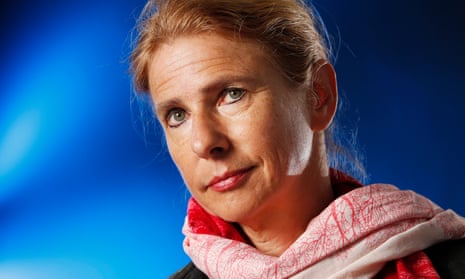Lionel Shriver’s blistering assertion that, “drunk on virtue”, Penguin Random House is putting diversity ahead of literary excellence has been dismissed by the publisher, which said on Monday that “books shape our culture, and this should not be driven only by people who come from a narrow section of society”.
Writing in the Spectator, Shriver took issue with an email sent by the publisher, which lays out its goal that by 2025, its authors and staff will reflect the diversity of UK society. The email said: “We want our authors and new colleagues to reflect the UK population taking into account ethnicity, gender, sexuality, social mobility and disability.”
Shriver wrote that this meant “we can safely infer … that if an agent submits a manuscript written by a gay transgender Caribbean who dropped out of school at seven and powers around town on a mobility scooter, it will be published, whether or not said manuscript is an incoherent, tedious, meandering and insensible pile of mixed-paper recycling”.
She added: “Drunk on virtue, Penguin Random House no longer regards the company’s raison d’etre as the acquisition and dissemination of good books. Rather, the organisation aims to mirror the percentages of minorities in the UK population with statistical precision. Good luck with that business model. Publishers may eschew standards, but readers will still have some.”
But Penguin Random House stood by its aims. “Our company-wide goal is driven by our strong belief that the books we publish should reflect the diverse society in which we live,” said the publisher, stressing that while it acquires all its authors “on talent, first and foremost”, it also believes it needs to do more “in actively seeking out talented writers from communities under-represented on the nation’s bookshelves”. It has recently launched the WriteNow programme, which aims to find writers from diverse backgrounds, and is recruiting staff “on talent and potential, not qualifications or former experience”.
“We firmly believe that giving a platform to more diverse voices will lead to a greater richness of creativity and stories, rather than stifling them,” it said.
Abir Mukherjee has just published the detective novel Smoke and Ashes, and is spearheading a new competition to find debut crime writers from BAME backgrounds. He was clear that “the playing field isn’t level … What PRH is doing is making it easier for hugely talented individuals from marginalised parts of our society to have their voices and their stories heard – not only those from minority groups, but white working-class voices too. This is about better reflecting the country we live in and publishing books that appeal to a wider cross-section of society, rather than tokenism or box-ticking.”
Author Candice Carty-Williams called Shriver’s comments “deeply embarrassing” on Twitter, adding: “While this belief of hers can only really come from a place of deep insecurity and fear of becoming obsolete, it also shows that she thinks that people of colour … don’t write good books.”
Novelist Meena Kandasamy, who was on the 2018 shortlist for the Women’s prize for fiction – an award won by Shriver for We Need to Talk About Kevin – suggested that “someone should do ironic blurb stickers that say ‘An incoherent, tedious, meandering and insensible pile of mixed-paper recycling – Lionel Shriver’ which diverse writers could dutifully display on their books as a reminder of the hostile environment in which they function”. Jack Monroe wrote on Twitter: “Writers from the margins: LGBT, BAME, disabled, working class etc, have to work TEN TIMES AS HARD to break into publishing because it is still largely controlled by STRAIGHT WHITE MEN”.
Shriver, who has expressed similar opinions in the past, was supported by Toby Young, who wrote on Twitter that “the problem with Penguin’s new, virtue-signalling inclusion policy is that any BAME, gay, trans or female authors it publishes from now on will worry that they haven’t been chosen on merit, but because they tick a diversity box”.
Young, the son of a Labour peer who intervened when Young failed to get a place at Oxford University, and who more recently stepped down from a position on the board of the Office for Students after widespread anger at his appointment, was taken to task for the comment by Labour MP David Lammy, who suggested: “If you are aware of anybody who has been given a job for any reason other than merit, for example someone who has been appointed to sit on the board of the Office for Students, please alert [Toby Young] to this injustice immediately.”
